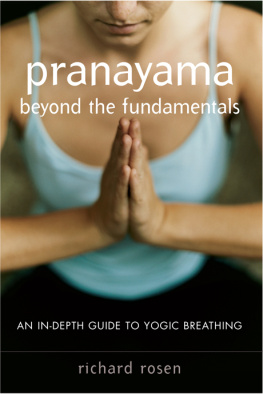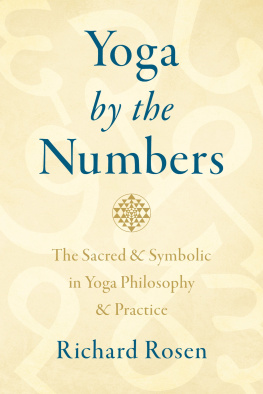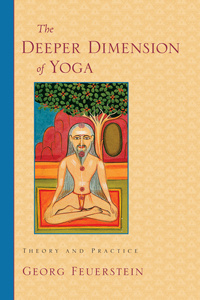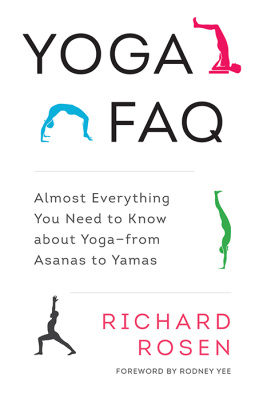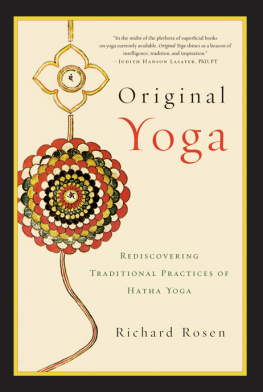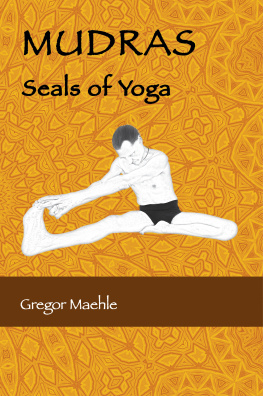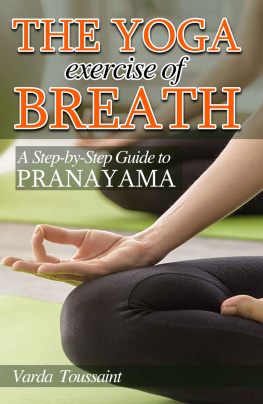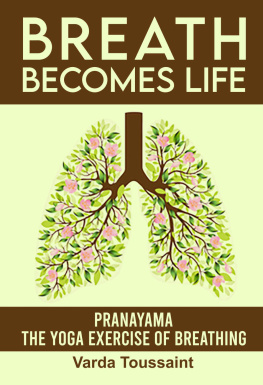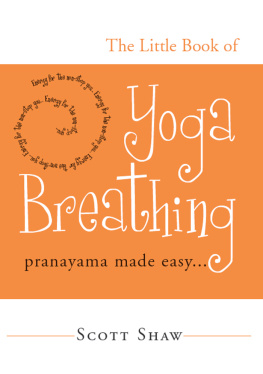Richard has impressed me with his depth of knowledge in his new book. Not only are we treated to comprehensive knowledge of the tradition of pranayama but we receive minute detail of Richards own arduous study and exploration. I will treasure this book for years to come as a personal guide to discovering the subtleties of my breath. Thank you again, Richard.
Rodney Yee, author of Moving Toward Balance
Rosen provides such valuable insights into a practice so often shrouded in mystery. He brings to light the classical teachings on pranayama while offering a fresh, contemporary perspective. I recommend this to all students of yoga interested in unraveling the mystery of a pranayama practice.
Tias Little, author of The Thread of Breath
This is an exceptional guide into the labyrinth of inner yogas. Richard Rosen is impeccably thorough, and his presentation is accessible and often amusing. Reading this book, I felt as though I was in the presence of an ancient yogi-scholar who is masquerading as a close personal friend. I highly recommend this book.
Sarah Powers
ABOUT THE BOOK
For serious students of yoga who have an established pranayama practice, this book is a follow-up to Rosens previous book, The Yoga of Breath. Here he picks up where he left off, offering a selection of traditional yogic techniques for those who wish to deepen their practice of pranayama and their understanding of the ancient wisdom of yoga. Rosen skillfully puts forward an array of awareness disciplines, breathing practices, mudras, and seals, interspersed with anecdotes and quotes from ancient texts.
A free audio program available online offers a variety of guided practices so that listeners can create their own pranayama series, with guidance from the author. (Download instructions available in the book.)
RICHARD ROSEN is a graduate of the Iyengar Institute of San Francisco and has been teaching yoga since 1987. He is a contributing editor at Yoga Journal magazine and director of and one of the principal teachers at the Piedmont Yoga Studio (cofounded by Rodney Yee), in Oakland, California. Many of Rosens practice instructions and technical teachings are posted on the Piedmont Yoga Studio website, www.piedmontyoga.com.
Sign up to learn more about our books and receive special offers from Shambhala Publications.

Or visit us online to sign up at shambhala.com/eshambhala.
PRANAYAMA
BEYOND THE FUNDAMENTALS
An In-Depth Guide to Yogic Breathing
RICHARD ROSEN

SHAMBHALA
Boston & London
2013
Shambhala Publications, Inc.
Horticultural Hall
300 Massachusetts Avenue
Boston, Massachusetts 02115
www.shambhala.com
2006 by Richard Rosen; illustrations 2006 by Kim Fraley
All quotations from the Gheranda Samhita and the Hatha Yoga Pradipika in this volume are from The Gheranda Samhita, by James Mallinson, 2004, and The Hatha Yoga Pradipika, by Svatmarama, translated by Brian Dana Akers, 2002. Reprinted by arrangement with YogaVidya.com.
All rights reserved. No part of this book may be reproduced in any form or by any means, electronic or mechanical, including photocopying, recording, or by any information storage and retrieval system, without permission in writing from the publisher.
Library of Congress Cataloging-in-Publication Data
Rosen, Richard.
Pranayama beyond the fundamentals: an in-depth guide to yogic breathing/Richard Rosen.1st ed.
p. cm.
Includes bibliographical references and index.
eISBN 978-0-8348-2512-3
ISBN-13: 978-1-59030-298-9 (alk. paper)
ISBN-10: 1-59030-298-2
1. Pranayama. 2. Hatha yoga. 3. Breathing exercises. I. Title.
RA781.7.R662 2006
613.7046dc22
2006013424
To Taleen:
Who wanted one all for herself
It is nothing but breath, the void.
And that green fulfillment
of blossoming trees: a breath.
We, who are still the breathed-upon,
today still the breathed-upon, count
this slow breathing of earth,
whose hurry we are.
Rainer Maria Rilke, O Lacrimosa
CONTENTS
AUTHORS usually get most of the credit for the books they write, but as any author knows, every book is the result of a cooperative group effort of which he or she is just a part. So Id like to thank the people who helped me with this book.
Thanks to the late Andre Bernard, who introduced me to the beautiful work of Mabel Todd and two of her students, Lulu Sweigard and Barbara Clark, from whom I draw my inspiration for channels and circuits.
Thanks to my editor at Shambhala, Emily Bower, whose guidance in this effort was invaluable.
Thanks again to the artist, Kim Fraley, whose drawings bring my words to vivid life.
Thanks to my model, Autumn Alvarez, who makes everything look easier than it actually is.
And thanks again to my breathing teachers, Manouso Manos, Arthur Kilmurray, and Ramanand Patel: everything of value in this book comes from them; all the mistakes are mine alone.
PRANA SAMVADA
ONCE UPON A TIME, Bhargava Vaidarbhi went to the sage Pippalada (whose name means eater of the fruit of the sacred fig tree), firewood in hand as a symbolic offering, and asked, Good sir, how many powers are there that establish and maintain the universe and its creatures, and which ones the best of all? Pippalada thought a bit, then told this tale:
The powersSpace, Air, Fire, Water, Earth, Speech, Mind, the Eye, and the Earwere talking among themselves, bragging really. They said: We establish and maintain this universe and the body (bana, literally reed or arrow). Breath (prana), who was really the best of them all, happened to hear them and rejoined: Friends, dont fool yourselves. I establish and maintain the universe and the body. The other powers pooh-poohed and didnt believe her.
So Breath, rather miffed at not being believed, decided to teach them a lesson. She moved upward, and guess what? All the others moved upward too. Then Breath settled down and, yes, all the others settled down with her. It was just like a swarm of bees following their queen wherever she went.
Now the powers realized their dependence on Breath and, delighted, sang her praises:
As fire, she warms; she shines like the sun
Shes the bountiful rain; shes the wind
Shes the earth, matter, shes God
Both being and not-being
And whats immortal.
Like spokes in a chariots wheel-hub
Everything is fixed in Breath
All the holy verses
The sacrifice, the royalty, even the priests!
As Lord of Creation, you move in the womb
And its also you whos born
You live with all creatures, Breath,
And they pay tribute to you.
Your form pervades speech
And hearing and sight and mind,
Make them all gracious (shiva)
And dont leave us!
All thats in heaven and earth and in between
Is in the power of breath
Protect us, as a mother does her children
Grant us prosperity (shri) and wisdom (prajna).
Prashna-Upanishad
(based on translations by Patrick Olivelle and Valerie Roebuck)
I Take Refuge in the Breath
I take refuge in the breath. Breath is all this, whatever there is, and all that ever will be. I take refuge in the breath.
Chandogya-Upanishad
THIS IS MY SECOND BOOK on pranayama. The first, The Yoga of Breath: A Step-by-Step Guide to Pranayama (Shambhala Publications, 2002), covered the beginning ABCs of the practice along with a program that, in the best of all possible worlds, would take a diligent student about a year to eighteen months to complete. Now the wonderful folks at Shambhala have asked me to do a follow-up bookthe DEFs, I supposethat presses on bravely to more challenging material.
Next page
